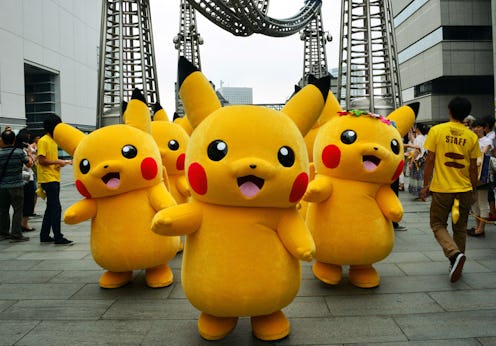Life
This Guy's House Is A "Pokemon Go" Gym
"Pokemon Go" has game players all over the country flocking to local landmarks to battle Pokemon for the control of gyms. Many players are loving the AR game for getting them out and about and interacting with other players, but what if your house were a "Pokemon Go" gym? One (lucky?) guy got to find out first-hand the questionable joys of having "Pokemon Go" designate your home as a gym. Fortunately, he seems to be taking everything in stride, but the situation does highlight just what can go wrong when a virtual world collides with the real one.
Boon Sheridan’s house in Holyoke, Massachusetts, is a converted church built in the 19th century. After downloading "Pokemon Go" last Friday, the UX designer was surprised to see that the game had designated his home as a gym — a site that appears on the app as a white stadium, where different teams compete for control. Soon enough, people started showing up at his house, phones in hand, to play the game. Because gyms are sites for training and battling, people wouldn’t simply pass by — they’d stand around and play for a while. Sheridan told BuzzFeed that, as of Sunday, at least 50 "Pokemon Go" players had approached his property.
So far, Sheridan has been a good sport about the unexpected droves of Pokemon lovers that have descended on his house. He’s even met the gym’s “owner.”
However, although Sheridan says that the visitors have been respectful, being the unwitting host of a Pokemon gym also has the potential to be seriously annoying, if not downright creepy. Sheridan said on Twitter, for example, that there were people stopping at his home to play "Pokemon Go" throughout the night, as well as cars stopping in front of his driveway.
Usually gyms crop up around prominent landmarks and meeting places. It’s possible that whoever assigned Sheridan’s house as a gym assumed that the home was a functioning church, rather than a private residence. But even though Sheridan’s home being assigned as a gym is most likely a mistake, that doesn’t make it any less problematic if you’re the one living there — and so far there doesn’t seem to be an obvious way to fix the issue. Tweeting about the situation, Sheridan says he hasn’t found a clear route to reporting the problem and getting it resolved:
A lot of good stuff has come from "Pokemon Go," even in the short time it’s been available. Players are having fun, exploring their cities, and interacting with new people. But Boon Sheridan’s church-turned-house-turned-Pokemon-gym highlights something important about incorporating gameplay into the real world: Reality is a lot messier than a tightly controlled virtual environment. Undoubtedly, the very unpredictability inherent in AR is a major reason that people love "Pokemon Go" in the first place, but this less controllable gaming environment carries with it inherent risk, as well as the potential to involve people in the game who don’t actually want to be involved.
Many aspects of this situation are humorous (and Sheridan seems to be having fun with it. At one point he suggested on Twitter putting up lights in front of his house that would change color with changes in gym “ownership.”), but it demonstrates that there are still a lot of kinks that need to be worked out in games that incorporate the real environment — especially ones with the potential to move so many people. If the popularity of "Pokemon Go" continues to grow — and it doesn’t seem to be stopping any time soon — there’s no doubt that questions about the logistics and nature of augmented reality (How are game locations selected? Who gets a say in those choices? How do the police and other public agencies ensure safety when crowds of players gather in public locations?) will continue to arise.
Bustle has reached out to Boon Sheridan for comment, and will update when we hear back.
